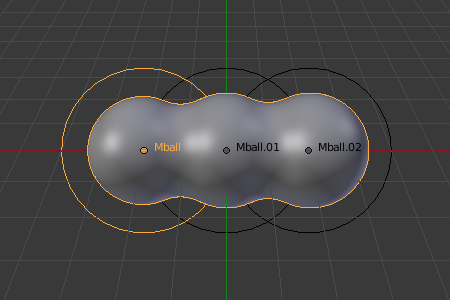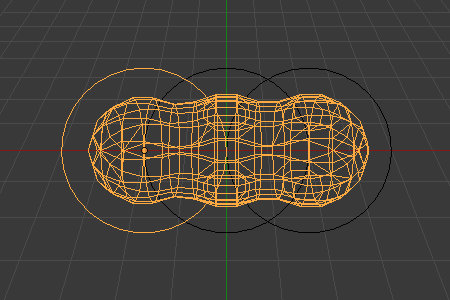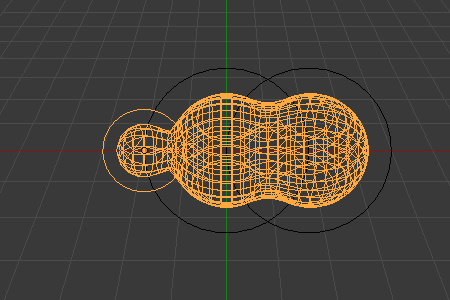Editing – Редагування#
In addition to having several meta objects in a same family, you can also have several meta primitives in a single object (just add some more while in Edit Mode). Each will be an element, with its own shape, editing rings (in the viewport), and settings.
Видалення Елементів – Deleting Elements#
Reference – Довідка
- Shortcut – Шоткат:
X, Delete
Ви можете лише видалити активний елемент, тут немає жодних вишуканих опцій.
Conversion – Конверсія#
Для конвертування мета у реальну сіть використовуйте Конвертація – Convert у Режимі Об’єкта – Object Mode.
Сімейства Об’єктів – Object Families#
Сімейство – «family» – це спосіб перегрупування кількох об’єктів мета, що дає дещо дуже схоже на наявність кількох мета всередині одного і того ж об’єкта.
It is defined by the left part of an object’s name (the one before the first dot).
Remember, an object’s name is the one in the Object Name field, in most panels,
not the Metaball Name field, which is the meta data-block’s name…
For example, the family part of «MetaPlane.001» is MetaPlane.
Each meta object in the same «family» is associated with one another as discussed below.

Сімейство метакулі.#
Families of metas are controlled by a base meta object which is identified by
an object name without a dot in it. For example,
if we have three metas called MetaThing, MetaThing.001,
MetaThing.round, the base meta object would be MetaThing.
The base meta object determines the basis, the resolution, the threshold, and the transformations. It also has the material and texture area. In a way, the base meta is the «owner» of the other metas in the family (i.e. it is as if the other metas were «included» or joined into the base one).
Підказка
При роботі одночасно з кількома сценами будьте обережні з іменуванням мета об’єктів так, щоб база завжди була у тій же сцені, що інші мета із сімейства.
Якщо це не так, це призведе до плутаної поведінки (ніби невидимі мета об’єкти).
Examples – Приклади#
Fig. База мета кулі. shows the base meta labeled «B». The other two Meta objects are children. Children’s selection rings are always black, while the group’s mesh is orange. Because the metas are grouped, they form a unified mesh which can always be selected by selecting the mesh of any meta in the group.

База мета кулі.#
Наприклад, на Ілюстрації База мета кулі., тільки нижня сфера (предок) буде вибрана, і ви бачите, що обидві, сіть предка та усі сіті нащадків, тепер підсвічені.

Масштабування «бази».#
The base meta object controls the polygonalization (mesh structure) for the group, and as such, also controls the polygonalization for the children (non-base) metas. If we transform the base meta, the children’s polygonalization changes. However, if we transform the children, the polygonalization remains unchanged.
Підказка
This discussion of «polygonalization» does not mean that the various meshes do not deform towards or away from each other (meta objects always influence one another in the usual way, within a same family).
Rather, it means that the underlying mesh structure changes only when the base object transforms. For example, if you scale the base, the children’s mesh structure changes.
In Fig. Масштабування «бази»., the base has been scaled down, which has the effect of scaling the mesh structure of each of the children. As you can see, the children’s mesh resolution has increased, while the base decreased. The children did not change size!